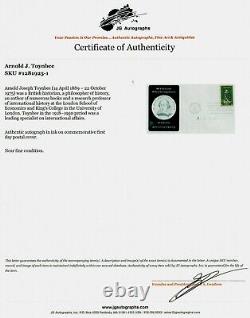Economic Historian Arnold Toynbee Hand Signed FDC From 1964 JG Autographs COA




"Economic Historian" Arnold Toynbee Signed First Day Cover Dated 1964. This item is certified authentic by JG Autographs and comes with their Certificate of Authenticity.
23 August 1852 - 9 March 1883 was a. Also noted for his social commitment and desire to improve the living conditions of the working classes. Toynbee was born in London, the son of the physician. His sister was the bacteriologist.
Toynbee was the uncle, via his brother Harry Valpy Toynbee, of. The two are often confused for each other due to the similarity of their names. In 1873 he began to study. Where he went on to teach after his graduation in 1878. He was deeply influenced by. States that he was one of Ruskin's warmest admirers and ablest pupils. He further notes that the philanthropic work of Toynbee truly illustrated the teaching of one of Ruskin's greatest books. His lectures on the history of the.In 18th- and 19th-century Britain proved widely influential; in fact, Toynbee coined. Or at least effectively popularised, the term "Industrial Revolution" in the Anglophone world-in Germany and elsewhere it had been brought into circulation earlier by. Also under the impression of the industrial changes in Britain. He married Charlotte Atwood, 12 years his senior and a cousin of. The famous rector of Stiffkey.
Toynbee died in 1883, at age 30. His health had rapidly deteriorated, probably due to exhaustion by excessive work. Notes that the publication of. S Progress and Poverty may be said to have brought about Toynbee's death: As [Toynbee] saw the book, it was full of economic heresies, and he resolved to answer them.
Of weak physique, but full of a passionate spiritual enthusiasm, he gave two lectures at St. Andrew's Hall, Oxford Street, against the book and the effort ended his career. He died for truth as he knew it, and those who knew him felt that his death was a national loss.


